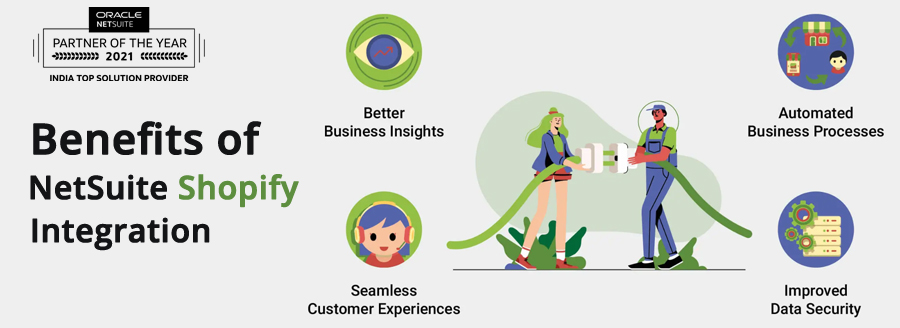Table of Contents
Integrating Shopify with a back-end system is powerful as NetSuite gives you a unified, 360-degree customer view and a smooth customer management operation Shopify NetSuite Integration lets you seamlessly connect ecommerce and in-store POS to order management, inventory, financials, marketing, and merchandising to streamline many business processes. With Shopify ERP Integration, you can automate transactions between your Shopify website and NetSuite, or sync your inventory in real-time — vastly reducing errors.
But many businesses struggle to Integrate Shopify with ERP due to rigid architectures, lack of specialty expertise, custom development requirements, and integration costs.
In this article, we break down these problems and demonstrate how you can solve them with the right solutions.
Challenges of Integrating Shopify to NetSuite
-
Error-prone Manual Integration Process
Perhaps of the greatest challenge in reconciliation is the requirement for manual human mediation. However NetSuite offers strong abilities, without a computerized joining into your frameworks, it can become tedious. In such a situation, clients are frequently compelled to physically enter information, expecting in-house mastery and expanding the gamble of human mistake.
Solution: Shopify NetSuite Integration
The solution is to implement a reliable automated integration process that saves both time and money.
-
Troublesome Programmatic Process
Shopify Integration with NetSuite often includes complex coding, requiring specialized aptitude or work with some high level improvement apparatuses implied exclusively for the most specialized among us. The process could be simplified with web service APIs offered by Shopify and NetSuite, but leveraging these APIs to create a solution can be a cumbersome process in itself.
Solution: Embedded APIs
The best solution is a ready-to-use solution that comes with embedded APIs or a Shopify NetSuite Connector and provides a low-code or no-code, visual UI that speeds the coordination cycle and permits less specialized clients to interface their applications.
-
High On Pockets
NetSuite itself addresses a critical ERP venture, without considering the intricacies of ERP-online business mix improvement, outsider merchant charges, or preparing costs for in-house specialists.
Solution: A Pocket-friendly Integration Platform
An enterprise really needs is a platform that provides simplicity in design, flexibility, and ease of integration — NetSuite Shopify Integration offers this all at a price point that’s easy on the pocketbook.
-
Real-Time Data Pipeline
Integrations are typically focused on maintaining back-end ERPs and keeping them in sync, while the web store is the customer touchpoint for sales and order placement. However, inconsistencies between the two remain a problem. Consider a model where a client needs to buy a thing that doesn’t exist in your Inventory. You would need a continuous stock pondered consistently your Shopify web store so individuals understand what’s available.
Solution: Built-in Data Replication
Your solution ought to give a continuous information sync pipeline so Shopify and NetSuite are generally exceptional and you can simply zero in on deals, as opposed to stressing over requests of inaccessible items. Shopify Plus NetSuite Integration promptly offers worked in information replication and guarantee ongoing following.
-
Downed Websites, Unhappy Customers, Lost Sales
Frequently, free time on a web store or site results from an inability to send a module or module that interfaces with back-end frameworks, intruding on business tasks and harming deals. An ideal incorporation ought to be free of such factors or give a different stage to coordinate your information, so you never leave clients hanging on your site as you lose uptime and deals.
Solution: Component Approach
Select a joining arrangement around your ERP System, for example, Shopify that utilizes a part based way to deal with isolated functionalities, so regardless of whether one part comes up short, your activity can move along as planned.
-
Tightly Knit ERP-Ecommerce Integration
Most organizations go for a closely knit answer for their ERP-online business combination, harming their capacity to change the front end without crushing the functionalities in the spirit end ERP.
Solution: Decoupling Your Endpoints
Decouple Shopify from NetSuite so changes can be made rapidly and effectively to the client experience part of your destinations — without affecting or requiring ERP-related improvement. An answer worked with connectors or ERP Integration with Shopify for your different information sources will permit you to independently change and update every framework, without wrecking your whole combination.
-
Monitoring and Auditing
Organizations often use a centralized monitoring system that oversees moves starting with one framework then onto the next. With such complex incorporations of NetSuite and Shopify, a designer’s most dreaded fear is on the off chance that some cycle among hundreds falls flat, and it requires physically evaluating logs to distinguish the issue. Unquestionably, you can utilize an outsider checking device or a different stage to conquer this test, yet that ought to be a pointless speculation.
Solution: Visual Integration with Built-in Reporting
You might need is a tool that can provide all integrations in the same visual canvas. NetSuite Shopify Integration provides a built-in monitoring and auditing mechanism that makes it easy to identify processes gone awry.
inoday, being a certified NetSuite Partner, holds rich capabilities around NetSuite Integration with Shopify and helps extend system efficiency without any hassle. You can connect with our NetSuite Integration Experts and let your business thrive in the advancing business world with custom-made, adaptive, and scalable software solutions.
For more information around Shopify NetSuite Integration, write to us at info@inoday.com Or Schedule A Demo








